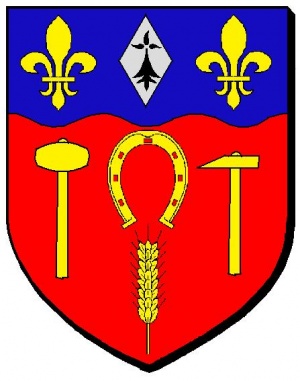Carrières-sous-Poissy: Difference between revisions
Jump to navigation
Jump to search
Knorrepoes (talk | contribs) m (Text replacement - "{{fr1}}↵{{media}}" to "{{fr1}} {{media1}}") |
Knorrepoes (talk | contribs) m (Text replacement - "|'''English''' ↵| {{blazon wanted}}" to "|'''English''' | blazon wanted") |
||
| Line 14: | Line 14: | ||
|- | |- | ||
|'''English''' | |'''English''' | ||
| | | blazon wanted | ||
|} | |} | ||
Revision as of 07:48, 7 April 2023
CARRIÈRES-SOUS-POISSY
Département : Yvelines
| French | De gueules au fer à cheval d'or accompagné d'une masse à dextre, d'un pic de carrier à senestre, d'un épi de blé en pointe, le tout du même ; au chef ondé cousu d'azur, chargé d'une losange d'argent surchargée d'une moucheture d'hermine de sable et accostée de deux fleurs de lis d'or. |
| English | blazon wanted |
Origin/meaning
The arms were adopted on November 9, 1984.
The horseshoe refers to the American horse breeder William Vanderbilt, who played a mayor role in the horse racing events in the village around 1900. The hammer and mallet refer to the former stone quarries. The wheatear refers to agriculture.
The wavy chief symbolises the Seine and the fleur-de-lys refer to the coat of arms of the royal Dominican abbey of Poissy, to which the village historically belonged. The ermine lozenge is taken from the arms of the Turgot Boisgelins family, who owned the Château Champfleury.
Literature: Image from http://www.armorialdefrance.fr
